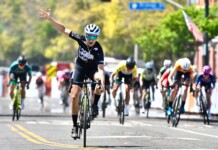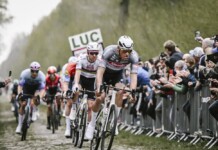November 1, 2012
By Jared Eborn
Lance Armstrong’s reach into cycling – from his base in Texas to Paris, France – was almost all-encompassing. At its peak, the Armstrong legend was all powerful.
And its influence was felt quite strongly here in Utah.
Fans were stunned. Critics were satisfied. But what about the professionals who call Utah home?
How did the bomb that was dropped by the United States Anti-Doping Agency impact guys like Levi Leipheimer, a long-time teammate of Armstrongs? What would happen to David Zabriskie, a Utah native who has established himself as one of the world’s best time trialists? Both confessed to using banned performance enhancing drugs and methods as part of the investigation into Armstrong and the U.S. Postal Service team.
Emails and phone calls from Cycling Utah to Leipheimer were not returned and Zabriskie declined to be interviewed.
“Honestly,” Zabrisie said via email, “I’m sorry I just can’t seem to bring myself to it right now.”
Both cyclists, however, did issue statements coordinated with the release of the USADA files and other statements since.
For Zabriskie, the choice to use PEDs was particularly painful.
“My father had a long history of substance use and addiction. Seeing what happened to my father from his substance abuse, I vowed never to take drugs. I viewed cycling as a healthy and wholesome outlet that would keep me far away from a world I abhorred,” Zabriskie wrote on his personal website (davezabriskie.com). “After distinguishing myself in an important race, management presented me with drugs and instructed me on how to proceed. I was devastated. I was shocked. I had never used drugs and never intended to. I questioned, I resisted, but in the end, I felt cornered and succumbed to the pressure.”
Zabriskie said in the USADA testimony that he felt he would lose his career if he didn’t fall in line with the team’s doping program. It was a decision, he said, that haunted him for years – even after he claims to have stopped using PEDs.
“It happened and I couldn’t be sorrier. It was a violation – a violation not only of the code I was subject to, but my personal and moral compass that I had set out to follow,” Zabriskie wrote. “I accept full responsibility and was happy to come forward and tell USADA my whole story; I want to do my share to help bring this entire issue to the fore and ensure a safe, healthy, and clean future for cycling.”
Likewise, Leipheimer admits to the doping but also says he entered that world with an eye focused on competitive success and that to not let go of his dreams he, too, needed to dope.
“Having made sacrifices for my dream, several years after I turned pro, I came to see cycling for what it was: a sport where some team managers and doctors coordinated and facilitated the use of banned substances and methods by their riders. A sport where the athletes at the highest level—perhaps without exception—used banned substances. A sport where doping was so accepted that riders from different teams—who were competitors on the road—coordinated their doping to keep up with other riders doing the same thing,” Leipheimer said in a statement published by the Wall Street Journal. “I regret that this was the state of affairs in the sport that we love and I chose as my career. I am sorry that I was forced to make the decisions I made. I admit that I didn’t let doping deter me from my dream. I admit that I used banned substances.”
Whatever the reason, whatever the motivation, the choice to use PEDs will have a profound impact on their careers. While Zabriskie appears to be safe with his Garmin-Sharp team, Leipheimer was fired by Omega Pharma-Quickstep in the wake of his disclosures.
Some professionals never did reach the Pro Tour. For them, the firestorm surrounding the Lance Armstrong saga has painful, or not, associated feelings.
But for many of those who did use PEDs, the opportunity most-recently presented by USADA to come clean was a door that didn’t need to be knocked on twice – for a variety of reasons. For starters, it was a chance to get an enormous weight off their chests and to clear their consciences. Secondly, it was also under oath and carried with it the threat of being convicted of perjury – like disgraced Olympic track and field star Marion Jones – and spending time in prison as a result. That the testimony would implicate Armstrong was not necessarily a motivating factor, but it might not be hard to imagine that being the case.
After rumors surfaced that Leipheimer had testified and that his statement likely identified Armstrong and long-time manager Johan Bruyneel as orchestrators of the doping system, Leipheimer testified his wife, Odessa Gunn, received an ominous and threatening text message from Armstrong while Leipheimer was out of the country. “Walk, don’t run” was the message and, Leipheimer said, the intimidation attempt reinforced his decision to have testified.
Zabriskie said testifying was akin to reopening an old wound. It was a step necessary, though, to fully clean and treat the damage.
“I returned to being 100% clean long before the Anti-Doping Commitment was issued for riders to sign in 2007. I was one of the first to sign. I embraced complete transparency,” Zabriskie wrote on his website. “When Slipstream surfaced I was eager to join for all that it stands for and its unwavering commitment to clean cycling. I only wish a team like this had existed when I was a neo pro. Cycling started out as a refuge for me and I want to play my part in making it the sport I had always hoped it would be and know that it can be.”
Leipheimer said he understands all of the admissions of doping – from himself to George Hincapie, Christian VandeVelde and others – will not sit well with cycling fans.
“I know that learning this will disappoint many of my fans and friends and I am sorry that the sport and I have let you down. Right or wrong, in my mind the choice was “do it or go home.” For me that was not a choice,” Leipheimer wrote. “I could have come forward sooner. But would that have accomplished anything—other than to end my career? One rider coming forward and telling his story in the face of cycling’s code of silence would not have fixed a problem that was institutional.”
No longer employed by a professional cycling team, Leipheimer’s admission may have ushered in his retirement.
“When USADA came to me and described a solution—where my admission could be part of a bigger plan that would make the positive changes we’ve seen in recent years permanent—I said ‘I need to be involved,’ ” he wrote. “I don’t want today’s 13 year olds to be discouraged by their parents from dreaming about one day riding the Tour de France.”
Zabriskie will return. After his six-month suspension is over in the spring – not-too-coincidentally when the offseason is coming to a close – Zabriskie will rejoin the peloton. The reaction from those he races with, however, is not yet known.
For now, the quirky Utahn with a famous sense of humor is keeping things close to the vest and expressing gratitude for those who have offered support.
“The overwhelming outpouring of support from cycling fans all over the world has been an enormous help to myself and my family,” he wrote. “While my testimony brought back many painful memories, it was necessary and I was anxious to provide it. The kindness I’ve received makes it easier to deal with — please accept my appreciation and huge, huge thanks to those who have taken the time to write or post or call or email their well wishes and who have chosen to maintain their belief in me. I’m deeply grateful.”








They should be banned from all Utah events including RMR. Nice to see they kick ass locally while on drugs. Makes everyone feel good.
Comments are closed.